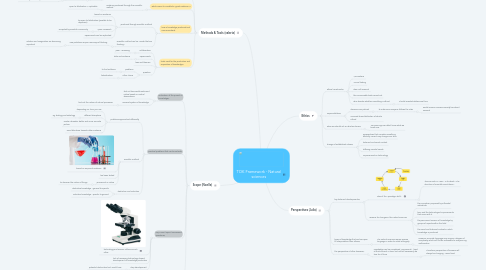
1. Methods & Tools (valeria)
1.1. assumptions that underlie methods of inquiry?
1.1.1. many assume that the scientific method is free from error
1.1.1.1. science = built by people
1.1.1.1.1. errors possible
1.1.1.2. objectivity
1.1.1.2.1. confirmation bias
1.2. what is seen to constitute “good evidence”?
1.2.1. evidence produced through the scientific method
1.2.1.1. open to falsification + replicable
1.3. how is knowledge produced and communicated?
1.3.1. produced through scientific method
1.3.1.1. based on evidence
1.3.1.2. be open to falsification (possible to be disproven)
1.3.1.3. "peer reviewed"
1.3.1.3.1. accepted by scientific community
1.3.1.4. experiments can be replicated
1.3.2. scientific method can be "inside the box thinking"
1.3.2.1. new problems require new ways of thinking
1.3.2.1.1. intuition and imagination are becoming important
1.4. tools used for the production and acquisition of knowledge?
1.4.1. collaboration
1.4.1.1. peer - reviewing
1.4.2. experiments
1.4.2.1. data and evidence
1.4.3. laws and theories
1.4.4. question
1.4.4.1. problems
1.4.4.1.1. to find solutions
1.4.4.2. other claims
1.4.4.2.1. faslisifiuaition
2. Scope (Noelle)
2.1. motivation of the pursuit of knowledge?
2.1.1. find out how world works and nature based on neutral observations
2.1.2. universal system of knowledge
2.1.2.1. find out the nature of natural processes
2.2. practical problems that can be solved?
2.2.1. problems approached differently
2.2.1.1. depending on 'lens' you use
2.2.1.2. different disciplines
2.2.1.2.1. eg. biology and astrology
2.2.1.3. create a broader, better and more accurate picture
2.2.1.4. avoid blindness towards other evidence
2.2.2. scientific method
2.2.2.1. based on empirical evidence
2.2.2.2. has been tested
2.2.2.3. provisional in nature
2.2.2.3.1. to discover the nature of things
2.2.3. deduction and induction
2.2.3.1. deductive knowledge - general to specific
2.2.3.2. inductive knowledge - specific to general
2.3. key current open/unanswered questions?
2.3.1. technology and science influence each other
2.3.2. lack of necessary technology slowed development of knowledge production
2.3.3. stop development
2.3.3.1. potential destruction tech could have
2.4. what makes this knowledge important?
2.4.1. create an interpretation of the world
2.4.2. knowledge about wold, in which we live in
3. Ethics
3.1. ethical constraints?
3.1.1. Vaccinations
3.1.2. Animal testing
3.1.3. stem cell research
3.1.4. the innumerable tests carried out
3.1.5. who decides whether something is ethical
3.1.5.1. should scientists determine this?
3.2. responsibilities?
3.2.1. decisions are policed
3.2.1.1. to make sure everyone follows the rules
3.2.1.1.1. would remove concerns society has about research
3.2.2. universal shared definition of what is ethical
3.3. when we should act on what we know?
3.3.1. 100 years ago we didn't know what we know now
3.4. change of established values?
3.4.1. perspectives that consider something ethically correct may change over time
3.4.2. historical and social context
3.4.3. differing societal needs
3.4.4. improvements in technology
4. Perspectives (Julia)
4.1. key historical developments?
4.1.1. Idea of the "paradigm shift"
4.1.1.1. Thomas Kuhn in 1962 - in his book "The Structure of Scientific Revolutions"
4.1.2. reasons for changes in the natural sciences:
4.1.2.1. the innovation proposed by influential individuals
4.1.2.2. time and the technological improvements that come with it
4.1.2.3. the permanent revision of knowledge by groups of experts within the field
4.1.2.4. the social and historical context in which knowledge is produced
4.2. types of knowledge that are less open to interpretation than others?
4.2.1. The natural sciences require precise language in order to avoid ambiguity
4.2.1.1. However, accurate language may require a degree of complexity, which will not be accessible to everyone eg. mathematics
4.3. the perspective of other knowers?
4.3.1. Knowledge can be considered "provisional" - best at that moment in time, but not will necessarily be true for all time
4.3.1.1. Therefore, perspective of knowers will always be changing - never fixed
